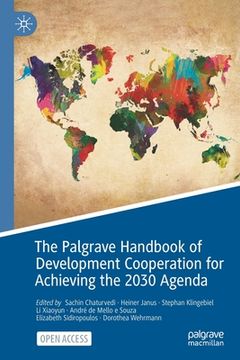The Palgrave Handbook of Development Cooperation for Achieving the 2030 Agenda: Contested Collaboration (in English)
Synopsis "The Palgrave Handbook of Development Cooperation for Achieving the 2030 Agenda: Contested Collaboration (in English)"
Foreword (Jorge Chediek).-Introduction: Contestation and Collaboration: Effective Development Cooperation for Achieving the 2030 Agenda.-Section 1: Changing Context of Development Cooperation - Current Narratives and Trends Chapter 1: An evolving shared concept of Development Cooperation (Milindo Chakrabarti and Sachin Chaturvedi, Research and Information System for Developing Countries, India).-Chapter 2: The globalisation of foreign aid: Global influences and the diffusion of aid priorities (Liam Swiss, Memorial University).-Chapter 3: Southernization of OECD's ODA approach (Paulo Esteves, BRICS Policy Center, Brazil / Stephan Klingebiel, DIE).-Chapter 4: Conceptualising ideational convergence of Chinese and "Western" aid (Heiner Janus, DIE / Tang Lixia, China Agricultural University).-Section 2: Global Development Norms and Institutional Architecture - Points of Convergence and Divergence Chapter 5: How to govern a global development cooperation regime? (André de Mello e Souza, Institute for Applied Economic Research, Brazil).-Chapter 6: The position of development policy: a functional definition(Adolf Kloke-Lesch, Sustainable Development Solutions Network Germany).-Chapter 7: The past and future of the emerging economies and the GPEDC: points of convergence and divergence (Gerardo Bracho, Centre for Global Cooperation Research).-Chapter 8: Should China join the GPEDC? The prospects for China and the Global Partnership for Effective Development Co-operation(Qi Gubo, China Agricultural University / Li Xiaoyun, China Agricultural University).-Section 3: Measurements of Development Cooperation - Frameworks and Theories for Assessments: Development Cooperation Chapter 9: 'From billions to trillions': Measuring financing the SDGs in a world 'beyond aid' (Emma Mawdsley, University of Cambridge).-Chapter 10: Future of the GPEDC Monitoring Framework (Debapriya Bhattacharya, Centre for Policy Dialogue).-Chapter 11: Monitoring and evaluation in South-South Cooperation: the case of CPEC in Pakistan (Murad Ali, DIE).-Chapter 12: African civil society organizations: Monitoring and Evaluation of CSO programmes (Fanwell Kenala Bokosi, AFRODAD).-Section 4: Multi-level perspectives on development cooperation for achieving the SDGs Domestic: Chapter 13: South Africa's changing role in development structures: Being in them but not of them (Elizabeth Sidiropoulos, South African Institute of International Affairs (SAIA).-Chapter 14: India's approach to development cooperation (Anthea Mulakala, The Asia Foundation).-Chapter 15: The SDGs, multilateral development organisations and maximsing the impact of U.S. development assistance (Anthony Pipa, Brookings).-Chapter 16: A middle way towards development cooperation: Foreign aid discourse of South Korea and Turkey in relation to the OECD DAC (Melis Baydag, Ruhr University Bochum).-Chapter 17: Malawi: a micro-cosm of the new development finance architecture (Neissan Besharati, Institute for Global Dialogue, South Africa).-Chapter 18: The role of development cooperation in new national planning in Least Developed Countries (Admos Chimhowu, University of Manchester / David Hulme, University of Manchester).-Triangular Cooperation: Chapt

